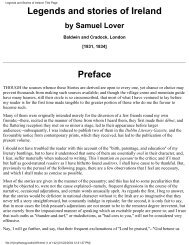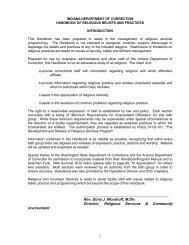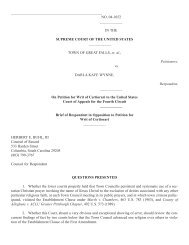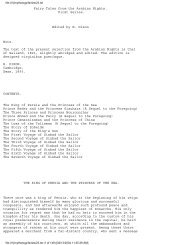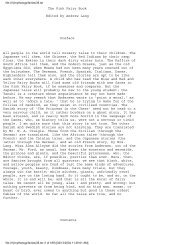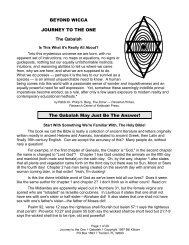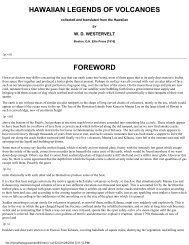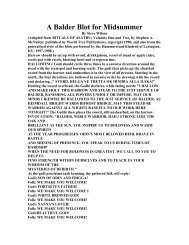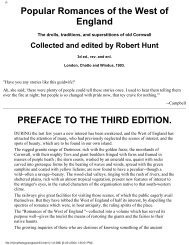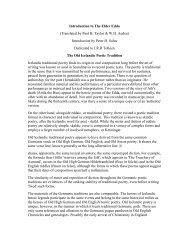Irish Druids And Old Irish Religions PREFACE CONTENTS
Irish Druids And Old Irish Religions PREFACE CONTENTS
Irish Druids And Old Irish Religions PREFACE CONTENTS
You also want an ePaper? Increase the reach of your titles
YUMPU automatically turns print PDFs into web optimized ePapers that Google loves.
Finnan, 134 B.C., is said to have first established <strong>Druids</strong> there. The Archdruid was known as Kion-druaight, or Ard-druaight. Plowden<br />
thought the <strong>Druids</strong> emigrated thither after the slaughter at Mona; others declare Mona to have been an <strong>Irish</strong> Druidical settlement.<br />
Sacheverell refers to Druidical cairns on the tops of hills, which were dedicated to the Sun, and speaks of hymns having what were called<br />
cairn tunes. Train says, "So highly were the Manx <strong>Druids</strong> distinguished for their knowledge of astronomy, astrology, and natural<br />
philosophy, that the Kings of Scotland sent their sons to be educated there." He thought that until 1417, "in imitation of the practice of the<br />
<strong>Druids</strong>, the laws of the Island were locked up in the breasts of the Deemsters." The old rude edifices of stone are still called Tinan<br />
Druinich, or <strong>Druids</strong>' houses. McAlpine says that Druid in Manx is Magician.<br />
FRENCH DRUIDISM.<br />
The Deroo of Brittany were more ancient, said Henri Martin, than those <strong>Druids</strong> known to Romans; being "primitive <strong>Druids</strong>, a sacerdotal<br />
caste of old Celts." Yet Forlong, who believed the Gallic coast tribes long traded and intermarried with the Phœnicians, saw "abundant<br />
evidences for their worshipping Astarte and Herakles." They were Saronidæ, or judges. They were the builders, masons, or like Gobhan<br />
Saer, free smiths. Of Saer, O'Brien in his Round Towers says--"The first name ever given to this body (Freemasons) was Saer, which has<br />
three significations: firstly, free; secondly, mason; and thirdly, son of<br />
p. 46<br />
God." Keane calls him "one of the Guabhres or Cabiri, such as you have ever seen him represented on the Tuath de Danaan Cross at<br />
Clonmacnoise."<br />
A Breton poem, Ar Rannou, a dialogue between a Druid and his pupil, is still sung by villagers, as it may have been by their ancestors, the<br />
Venite of Cæsar's story. The seat of the Archdruid of Gaul was at Dreux.<br />
French writers have interested themselves in the Druidic question. The common impression is that <strong>Druids</strong> were only to be found in<br />
Brittany; but other parts of France possessed those priests arid bards. Certainly the northwest corner, the region of megalithic remains,<br />
continued later to be their haunt, being less disturbed there. It was in Brittany, also, that the before-mentioned Oriental mysticism found so<br />
safe a home, and was nurtured so assiduously. But <strong>Druids</strong> were equally known in the south, centre, and north-east of France.<br />
Dijon <strong>Druids</strong>, or the Vacies, were described in 1621 by Guenebauld of Dijon in Le Reveil de Chyndonax, Prince des Vacies Drvydes<br />
Celtiqves Düonois. Upon the tomb of the Archdruid Chyndonax was found an inscription in Greek, thus rendered by the Dijon author--<br />
"En ce tombeau, dans le sacré boccage<br />
Du Dieu Mithras, est contenu le corps<br />
De Chyndonax grand Prestre; mechant hors,<br />
Les Dieux Sanneurs le gardent de dommage."<br />
Numbers of the learned went to view the inscription, and an urn found within the tomb. Mithras was a form of Apollo, or the Sun. There<br />
are other evidences of the southern Gaulish <strong>Druids</strong> using Greek characters, beyond Cæsar's assertions.<br />
Guenebauld spoke of the prohibition of the Druidical religion by the Emperors Augustus, Tiberias, and Claudius; adding that the <strong>Druids</strong><br />
"furent chassez du mont Drvys or<br />
p. 47<br />
Drvyde proche d'ostum, a cause de leur trop cruel sacrifice d'hommes." He declared that after the general Edict of Claudius "il ne s'en<br />
treuva plus, parmy les Gaulois." When banished from Gaul, they retired to Britain, though Druidesses were mentioned as being at Dijon in<br />
the time of Aurelian.<br />
Beaudeau, in 1777, published Memoire à consuilter pour les anciens Druides Gaulois, intended as a vindication of them against the<br />
strictures of Bailly in his letters to Voltaire. He had a great belief in the astronomical skill of the <strong>Druids</strong>, from their use of the thirty years<br />
cycle, the revolution period of the planet Saturn.<br />
At the Congress of Arras, in 1853, the question debated was--"Up to what period Roman polytheism had penetrated into Belgic Gaul;--and<br />
up to what period continued the struggle between Polytheism and Christianity?" The French author remarks, "The Romans did but one<br />
thing--gave the names of their gods to the divinities of the people of Fleanderland. <strong>And</strong> these divinities--what were they? Evidently those<br />
of the country from which the people had been forced to flee."<br />
Dezobry and Bachelets, in their Dictionnaire de Biographie, &c., affirm that "the Celtic word derouyd (from de or di, God, and rhoud or<br />
rhouid, speaking) signifies Interpreter of the gods, or one who speaks from the gods. According to others, the etymology should be, in the<br />
Gaelic language, druidheacht, divination, magic; or, better, dern, oak, and wydd, mistletoe." Acknowledging the ancient renown of their<br />
knowledge, it is admitted to be imperfectly known to us, though Pythagoreans pretended to be the founders thereof. The French authors<br />
had the following account of the <strong>Druids</strong>' great charm--<br />
"They carried suspended from their neck, as a mark of dignity, a serpent's egg--a sort of oval ball of crystal,<br />
file:///I|/mythology/witchcraft/8/8.html (18 of 114) [02/05/2004 8:38:14 AM]



